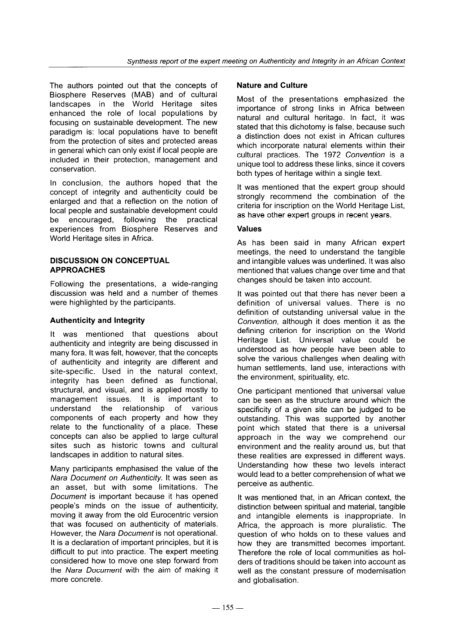Mul - unesdoc - Unesco
Mul - unesdoc - Unesco
Mul - unesdoc - Unesco
You also want an ePaper? Increase the reach of your titles
YUMPU automatically turns print PDFs into web optimized ePapers that Google loves.
Synthesis report of the expert meeting on Authenticity and lntegrity in an African Context<br />
The authors pointed out that the concepts of<br />
Biosphere Reserves (MAB) and of cultural<br />
landscapes in the World Heritage sites<br />
enhanced the role of local populations by<br />
focusing on sustainable development. The new<br />
paradigm is: local populations have to benefit<br />
from the protection of sites and protected areas<br />
in general which cari only exist if local people are<br />
included in their protection, management and<br />
conservation.<br />
In conclusion, the authors hoped that the<br />
concept of integrity and authenticity could be<br />
enlarged and that a reflection on the notion of<br />
local people and sustainable development could<br />
be encouraged, following the practical<br />
experiences from Biosphere Reserves and<br />
World Heritage sites in Africa.<br />
DISCUSSION ON CONCEPTUAL<br />
APPROACHES<br />
Following the presentations, a wide-ranging<br />
discussion was held and a number of themes<br />
were highlighted by the participants.<br />
Authenticity and Integrity<br />
It was mentioned that questions about<br />
authenticity and integrity are being discussed in<br />
many fora. It was felt, however, that the concepts<br />
of authenticity and integrity are different and<br />
site-specific. Used in the natural context,<br />
integrity has been defined as functional,<br />
structural, and visual, and is applied mostly to<br />
management issues. It is important to<br />
understand the relationship of various<br />
components of each property and how they<br />
relate to the functionality of a place. These<br />
concepts cari also be applied to large cultural<br />
sites such as historic towns and cultural<br />
landscapes in addition to natural sites.<br />
Many participants emphasised the value of the<br />
Nara Document on Authenticity. It was seen as<br />
an asset, but with some limitations. The<br />
Document is important because it has opened<br />
people’s minds on the issue of authenticity,<br />
moving it away from the old Eurocentric version<br />
that was focused on authenticity of materials.<br />
However, the Nara Document is not operational.<br />
It is a declaration of important principles, but it is<br />
difficult to put into practice. The expert meeting<br />
considered how to move one step forward from<br />
the Nara Document with the aim of making it<br />
more concrete.<br />
- 155--<br />
Nature and Culture<br />
Most of the presentations emphasized the<br />
importance of strong links in Africa between<br />
natural and cultural heritage. In fact, it was<br />
stated that this dichotomy is false, because such<br />
a distinction does not exist in African cultures<br />
which incorporate natural elements within their<br />
cultural practices. The 1972 Convention is a<br />
unique tool to address these links, since it covers<br />
both types of heritage within a single text.<br />
It was mentioned that the expert group should<br />
strongly recommend the combination of the<br />
criteria for inscription on the World Heritage List,<br />
as have other expert groups in recent years.<br />
Values<br />
As has been said in many African expert<br />
meetings, the need to understand the tangible<br />
and intangible values was underlined. It was also<br />
mentioned that values change over time and that<br />
changes should be taken into account.<br />
It was pointed out that there has never been a<br />
definition of universal values. There is no<br />
definition of outstanding universal value in the<br />
Convention, although it does mention it as the<br />
defining criterion for inscription on the World<br />
Heritage List. Universal value could be<br />
understood as how people have been able to<br />
solve the various challenges when dealing with<br />
human settlements, land use, interactions with<br />
the environment, spirituality, etc.<br />
One participant mentioned that universal value<br />
cari be seen as the structure around which the<br />
specificity of a given site cari be judged to be<br />
outstanding. This was supported by another<br />
point which stated that there is a universal<br />
approach in the way we comprehend our<br />
environment and the reality around us, but that<br />
these realities are expressed in different ways.<br />
Understanding how these two levels interact<br />
would lead to a better comprehension of what we<br />
perceive as authentic.<br />
It was mentioned that, in an African context, the<br />
distinction between spiritual and material, tangible<br />
and intangible elements is inappropriate. In<br />
Africa, the approach is more pluralistic. The<br />
question of who holds on to these values and<br />
how they are transmitted becomes important.<br />
Therefore the role of local communities as hol-<br />
ders of traditions should be taken into account as<br />
well as the constant pressure of modernisation<br />
and globalisation.

















